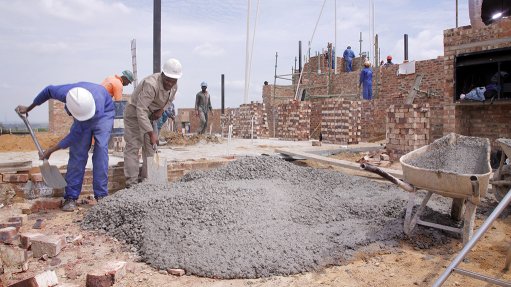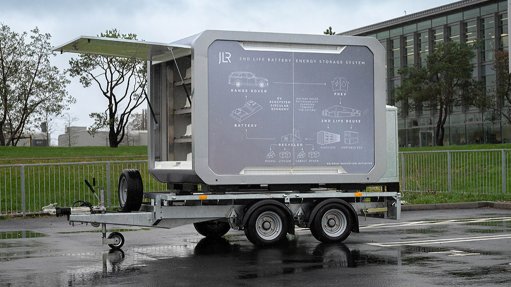A decade of lost growth
Banking group Absa new sector development in retail and business banking head Justin Schmidt highlights how a lack of public-sector spend has impacted on demand for locally manufactured goods.
The continued bail-outs for struggling State-owned enterprises and tough decisions on where government should spend its scarce resources are making it extremely difficult for the public sector to kick-start additional demand for locally manufactured goods. The manufacturing sector has borne the brunt of this lack of infrastructure spend and stimulus for demand for multiple years.
A lack of infrastructure investment is always a drag on growth. Poor roads, unreliable rail and/or ports increase costs and aggravate inefficiencies for businesses. Simply put, the opportunity cost of unreliable infrastructure is significant, which is why private- and public-sector investment is so important – it ensures a solid base from which to achieve South Africa’s growth potential. For the manufacturing sector, this lack of investment has had a direct negative impact on demand for products.
Indirectly, it has created headwinds for growth, as it increases the transaction costs in the supply chain and lowers competitiveness. A lack of reliable energy supply from State-owned electricity utility Eskom is a significant constraint for manufacturers. Sector gross domestic product and sales numbers are not the only data that should be taken into account to get a complete picture of the situation – volumes also need to be overlaid. Although the manufacturing secture has recovered from the fallout of the global financial crisis, manufacturing production volumes are still roughly at the same level as in 2008.
The concern is that we are not investing in (net) new capacity because of a lack of additional demand. One subsector that has seen uninterrupted sales and volume increases is food and beverage manufacturing. There was no major impact felt from the global financial crisis and production volumes are well above the 2008 level.
Food and beverage manufacturing is a defensive subsector that should generally see steady growth. Even when the economy is under pressure, people still eat and drink. Our agriculture sector is world class and a reliable supplier of high-quality products for these manufacturers. Further, there has been much private- sector investment over the past decade and strong infrastructure development in terms of transport and storage of these products. Our success in this subsector is the ‘premiumisation’ (emphasising superior quality of the product) of an already world-class product.
This means that the subsector is able to generate strong margins, which allow for further reinvestment in capacity and infrastructure and, in turn, result in a local product that is competitive against imports.
Wish List for 2020 and the ‘Premiumisation’ of the Sector
We have started to see some positive signs that support higher production levels for the manufacturing sector.
Firstly, the Integrated Resource Plan (South Africa’s blueprint for energy production) was recently signed – we had been waiting for this guiding document for over a decade. This will allow for investment in new generation capacity and greater competition in the generation of energy. Secondly, President Cyril Ramaphosa’s 2019 South African Investment Conference saw an increase in commitments to new investment, compared with the previous year’s number.
The investments ranged from telecoms to motor vehicle manufacturing and there was the signing of the Retail, Clothing, Textile, Footwear and Leather ‘Masterplan’. Lastly, more accommodative policies for the tourism sector, including the introduction of e-visas and the reversal of the policy requiring minor children travelling with their parents to produce unabridged birth certificates, are progrowth signs that, in the long run, will allow for further investment in our airports and the infrastructure supporting our national tourism assets.
We are seeing positive glimmers following the ‘lost decade’ of production volumes but need to see more private- and public-sector capital being channelled into infrastructure, greater electricity generation capacity through private-sector investments and more traction with respect to the delivery of coherent and supportive government policies that boost manufacturing (especially for those subsectors and products where we have competitive advantages).
Schmidt heads New Sector Development in Retail and Business Banking at Absa - justin.schmidt@absa.africa
Comments
Press Office
Announcements
What's On
Subscribe to improve your user experience...
Option 1 (equivalent of R125 a month):
Receive a weekly copy of Creamer Media's Engineering News & Mining Weekly magazine
(print copy for those in South Africa and e-magazine for those outside of South Africa)
Receive daily email newsletters
Access to full search results
Access archive of magazine back copies
Access to Projects in Progress
Access to ONE Research Report of your choice in PDF format
Option 2 (equivalent of R375 a month):
All benefits from Option 1
PLUS
Access to Creamer Media's Research Channel Africa for ALL Research Reports, in PDF format, on various industrial and mining sectors
including Electricity; Water; Energy Transition; Hydrogen; Roads, Rail and Ports; Coal; Gold; Platinum; Battery Metals; etc.
Already a subscriber?
Forgotten your password?
Receive weekly copy of Creamer Media's Engineering News & Mining Weekly magazine (print copy for those in South Africa and e-magazine for those outside of South Africa)
➕
Recieve daily email newsletters
➕
Access to full search results
➕
Access archive of magazine back copies
➕
Access to Projects in Progress
➕
Access to ONE Research Report of your choice in PDF format
RESEARCH CHANNEL AFRICA
R4500 (equivalent of R375 a month)
SUBSCRIBEAll benefits from Option 1
➕
Access to Creamer Media's Research Channel Africa for ALL Research Reports on various industrial and mining sectors, in PDF format, including on:
Electricity
➕
Water
➕
Energy Transition
➕
Hydrogen
➕
Roads, Rail and Ports
➕
Coal
➕
Gold
➕
Platinum
➕
Battery Metals
➕
etc.
Receive all benefits from Option 1 or Option 2 delivered to numerous people at your company
➕
Multiple User names and Passwords for simultaneous log-ins
➕
Intranet integration access to all in your organisation


















